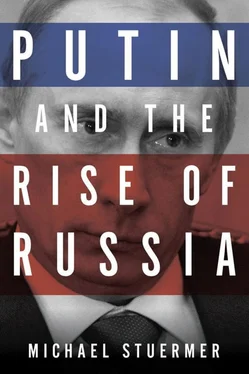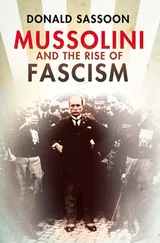Referring to energy relations with Western Europe in general, Germany in particular, he mused: ‘We are happy with the situation. Even at the worst of times Russia has never allowed interruptions to take place.’ He was hinting at the strange paradox of the early 1980s when the Soviet Union directed its ultramodern nuclear-tipped medium-range missiles codenamed SS20 at Western Europe while Germans and Soviets, much to the dismay of the Reagan administration, continued to negotiate, and conclude, the gas-pipeline deal: the German government under Chancellor Helmut Kohl was not only interested in swapping pipelines and pumping stations for gas but also in sending a signal of business as usual – while the German electorate, driven by nuclear angst, expected the end of the world. It was a balancing act and a masterful manoeuvre.
Now, Russia’s Gazprom reigns supreme, aiming to add a third pipeline on the bottom of the Baltic Sea to the two older and landbound ones carrying natural gas to the West, and Putin is the state monopoly’s prophet: ‘An additional pipeline in the direction of the EU is due in order to broaden the distribution system for Europe.’ But why, the question is bound to follow, not via Eastern Europe this time but on the bottom of the Baltic Sea, from near St Petersburg to Pomerania in Germany and on to the Netherlands and England? ‘The revolutionary movements in Ukraine,’ Putin says with disarming openness – and with more than a little schadenfreude . Poland failed to come up with the money. ‘And this thing should stay outside of politics, anyway,’ he says with a wry smile, as if oil and gas could ever exist in a politics-free zone. ‘We want to exclude nobody,’ he says, and tries to calm rising concern. Then he turns to detail and shows his mastery of the small print: ‘We have concluded contracts for more than sixty billion cubic metres.’ Moreover, Russia is slowly ridding itself of surface pipelines: ‘The first tanker carrying liquefied natural gas [LNG] is on its way to the US.’ As if to warn the Europeans that Russia can find customers all over the world, he adds that soon a pipeline will bring natural gas to Turkey via the Black Sea (by late 2007 around 60 per cent of Turkey’s needs were met in this way). More pipelines are being built in the direction of the Far East. To northern China’s industries or to Japan? ‘Relations with the People’s Republic of China are good. When, fifteen years ago, the Soviet Union collapsed, there were security problems. By now we have reliable treaties concerning borders.’ Did he hint at fears, back in 1991, that China might take advantage of Russia’s time of troubles? Or did he allude to the Russian concern about vast numbers of Chinese looking at the empty spaces of Siberia? Or about filling the power vacuum left by the demise of the Soviet Union in Central Asia? Putin, instead of addressing hidden fears, assured his audience that economic relations with mainland China were good, especially when it comes to military-industrial cooperation. That tends to help the Russian arms industry – but it also leaves Russian generals worrying about the future. In the past, Russia would sell at best second-rate goods to China. By 2005, only the best would be accepted by Chinese buyers paying US dollars.
What role for Japan in the Far Eastern puzzle? ‘For us, Japan is a strategic partner. In the Asia Pacific region we see a balance of power at work.’
Of course, Putin is aware that this complex balance could be seriously upset by North Korea acquiring the bomb. Here, once more, he cites common interests with China and the US, mentioning Great Britain and France in passing. The Nuclear Club has its own set of rules, and its own exclusive interests, and preserving the Non-Proliferation Treaty is essential not only for reasons of security, but also for status and prestige.
The conversation, at this point, was bound to drift towards Iran. In Busheer on the northern shore of the Persian Gulf the Russians are building, after Siemens gave up the site in 1979 due to the second coming of Ayatollah Khomeini, a nuclear power plant which the Americans resent and the rest of the world, especially the Israelis and the Arabs, view with a watchful eye.
Putin: ‘Is it meaningful to summon the Iranians to the UN Security Council? We have talked to our Iranian friends and advised them to keep their unilateral promises. Everything they have done so far is within the rules of the NPT . But we have warned them that throughout the Greater Middle East an explosive situation is forming. We do not exclude referring the matter to the UN Security Council.’ Unlike German Chancellor Schröder, Putin refrains from any criticism of the US in this matter. Controversy ends at the NPT’s edge. ‘Between the US and ourselves there is no problem if there is cooperation.’ And, ‘by the way’, he added a reassuring note to often-heard concerns, ‘Russian control over our own nuclear facilities is watertight.’
In the summer of 2005, Moscow was abuzz with talk about the ‘orange revolution’ in neighbouring Ukraine. Could something similar occur his side of the border? Putin sounded less than relaxed: ‘I think we have no reason to expect destabilization’ – codeword for democratic change. But he is obviously aware of the potential for trouble, especially through the vast gap between the super rich New Russians and the rest of the population. ‘We have to continue the policies which we have conducted so far. Over the last few years real income of the broad population has grown by ten per cent. We have to strengthen the middle classes, the party system and independent mass media.’ The last point in particular visibly raised some eyebrows and made everybody wonder what he meant. ‘The main reasons for the Ukrainian revolution were poverty and unemployment, on top of endemic corruption.’ We are not against change in the post-Soviet space. But we want to make sure that those changes do not end in chaos.’
Does he see Western intentions to meddle in Eastern Europe? His answer was clearly more diplomatic than realistic: ‘We entertain, to be sure, nothing like a hostile attitude towards the EU. We want stability in the former Soviet space. We want to avoid a split between east and west in Ukraine. The Russians in Ukraine deserve a safe future. We cannot go back to the Russian Empire. Even if we wanted to – it would be impossible.’
Managed democracy or authoritarianism – is this the style he wants? ‘Democracy exists, or it does not exist. A state of law, democratic elections are part of it. All politicians draw criticism. How would that materialize without free institutions? We try to optimize the fabric of society. We aspire to peace and prosperity for the people.’ Sometimes Putin cannot help using Western jargon. ‘Of course we have to grapple with the traditions of this country. We cannot live on imitation. I listen to criticism. And if it sounds justified, I act accordingly.’
How does he see his own future after the end of his second term as president in 2008? ‘I shall leave the Kremlin, but not Russia,’ he answered, avoiding anything more precise. But the question was thrown back to him. There were rumours that he would aim for a third term. What role would he play? ‘I would like to see that my experience and my knowledge are being used by the Russian people.’ But the question was tossed back a second time. Were there not indications that he might seek a third term? ‘Is that a recommendation?’ Putin quipped. And then, on a more serious note: ‘I repeat, I shall not run for President in 2008. The most important thing is to secure stability. No, we shall not change the constitution. You will see.’ As for the oil price: what will the President do when and if the price for a barrel reached $80, and windfall profits continued to accrue. Putin answered, ‘Eight months ago I had a visitor who wanted to know my prognosis for the oil price. I quoted roughly eighty dollars. Without the shocks and upheavals of the last few months the price would have been between forty and fifty US dollars. This I see as healthy. What we are going to do with the money? Presently we have a budget surplus and a positive balance of trade. Our gold reserves are high. We recognize a high risk of inflation. Therefore a good part of the petrodollars will go into the stabilization fund, another into the repayment of foreign debt. A third into social improvements, education, science, reduction of taxes.’ In fact, only a few days before, Putin had decided to improve the tough lot of Russia’s underpaid public employees and announced a programme of financial improvements for doctors, nurses, teachers and the like. It was a sign not only that the losers of the reform deserved some belated help but also that Putin and his people had taken a page out of Western democracies’ book on how to win elections. While the Porsches and Jaguars zigzagging across Moscow’s vast highways and byways are the toys of the newly rich, those left behind in the new Russia must receive a consolation prize and a share of the vast petrodollar fortune that Russia had amassed ever since Putin had come into office.
Читать дальше











